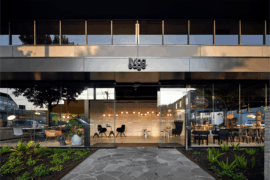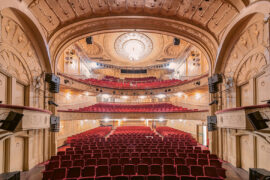Set amidst Tokyo’s cyberpunk skyline, this hotel and restaurant nevertheless bring significant Scandivanian softness to the scene.

September 18th, 2024
Hotel Toranomon Hills, the latest storied hotel in Hyatt’s Unbound Collection, opened its doors in December 2023 and quickly established itself as a premier destination within Tokyo’s vibrant urban landscape. Nestled between the historic Imperial Palace and the Zojo-ji temple complex (which houses six Tokugawa shoguns), this luxurious hotel offers a unique vantage point and occupies the first and 11th to 14th floors of the ‘vertical city’ of Toranomon Hills Station Tower.
As one steps into one of its 205 rooms, it’s hard to move past the sweeping and prodigious views of Tokyo’s cityscape – with many rooms offering a striking vista of Tokyo Tower.

The hotel is a testament to the harmonious convergence of Scandinavian and Japanese design sensibilities. Danish studio Space Copenhagen, acclaimed for their ‘slow aesthetics’ design philosophy, has imbued the interiors with a softness and roundedness. It’s most pronounced in their choice of materiality and shapes, which stand in contrast to Tokyo’s jagged skyline. Celebrated for its emphasis on elegance and longevity, this design ethos manifests in the hotel’s minimalist design, which features muted earthy palettes and subtle textures. These serve to foster a sense of calm and respite in a sea of glass, metal and concrete.
Space Copenhagen incorporated a range of bespoke tables and sofas, while the principal dining chair is a custom design by Fredericia. Additional dining chairs in grey stained oak, as well as high stools, are from Mater, and &Tradition’s celebrated Como and Manhattan battery-powered lights are also featured.

Meanwhile, the design language speaks to an egalitarian pursuit for every room regardless of its category, offering guests the same opportunity to share in a carefully crafted experience. On the 11th floor sits the Lounge, a retreat aimed at both the business- and leisure-minded which offers a space for contemplation, meetings and respite. Notably, it’s also available to guests even after check-out.
The room interiors make use of modular elements such as sliding doors, reminiscent of shoji screens in a ryokan, but also carefully curated design pieces which ensure that the spaces are as functional as they are luxurious.
Related: Peter Zumthor and Vals Thermal Baths

The lobby of Hotel Toranomon Hills serves as the nucleus, connecting three distinct access points: the Toranomon Hills subway station, the street level, and the car park. This central hub is not just a point of arrival but a space where guests can experience the pulse of the hotel’s lively ambiance. Central to this space is Le Pristine café, an all-day dining venue serving up not only food but also beats curated personally by Michelin-starred chef, Sergio Herman. The Zeeland-born chef is also the founder of Le Pristine Tokyo on the same floor and Le Pristine in Antwerp, all designed by Space Copenhagen.
Le Pristine Tokyo provides an immersive street-level perspective of the Toranomon Hills district, and is crafted as a synthesis of design, art, fashion and music. It features striking art installations and bespoke furniture by notable artists such as Maarten Baas and the Dutch design collective, Rotganzen. The restaurant’s mission is simple: it invites diners to experience casual fine dining and enjoy a cuisine multilayered in its inspiration.


Herman’s personal touch is felt mostly here, at the dining table, where he orchestrates things according to ‘New Italian’ cuisine – as well as his own collection of life experiences. The chef invites diners not to sample Japanese cuisine but to savour Japanese ingredients woven into Italian traditions, all while honouring his Dutch heritage. It’s a singular fusion best understood as being its own thing, and it has Herman’s stamp all over it.
In its entirety, Hotel Toranomon Hills stands as a significant addition to Tokyo’s hospitality scene. With its integration of luxurious design, functional spaces and casual fine dining, it seeks to embody a commitment to both business and leisure travel. Its blend of Scandinavian and Japanese design principles, coupled with Herman’s autobiographical offerings at Le Pristine Tokyo, ensures that every guest experiences a contemplative and memorable stay in the heart of one of the world’s most dynamic cities.
Space Copenhagen
spacecph.dk
Toranomon Hills Hotel
hyatt.com
Le Pristine
lepristinetokyo.com
Photography
Joachim Wichmann
















We think you might also like this project feature on W Osaka designed by Tadao Ando.
INDESIGN is on instagram
Follow @indesignlive
A searchable and comprehensive guide for specifying leading products and their suppliers
Keep up to date with the latest and greatest from our industry BFF's!

Welcomed to the Australian design scene in 2024, Kokuyo is set to redefine collaboration, bringing its unique blend of colour and function to individuals and corporations, designed to be used Any Way!

For Aidan Mawhinney, the secret ingredient to Living Edge’s success “comes down to people, product and place.” As the brand celebrates a significant 25-year milestone, it’s that commitment to authentic, sustainable design – and the people behind it all – that continues to anchor its legacy.

Auckland Design Week returns for its third edition in March, unveiling an expanded programme and a renewed focus on the relationship between people, communities and the places they shape.

In Naturalizing Architecture, Takada moves beyond biomimicry to propose a regenerative vision for the urban environment.
The internet never sleeps! Here's the stuff you might have missed

Community, Country and climate were centred at the 2025 Australian Institute of Landscape Architects (AILA) Awards in Lutruwita/Tasmania on 21st October.

A new book documents the city’s historic building interiors, from 1800s coffee palaces to post-war modernist spaces.

Neill Johanson, Principal at Davenport Campbell, comments on what we might be losing and gaining with the expansion of remote work.

Central Station by Woods Bagot in collaboration with John McAslan + Partners has been named one of two joint winners of The Building category at the INDE.Awards 2025. Recognised alongside BVN’s Sirius Redevelopment, the project redefines Sydney’s historic transport hub through a transformative design that connects heritage with the demands of a modern, growing city.